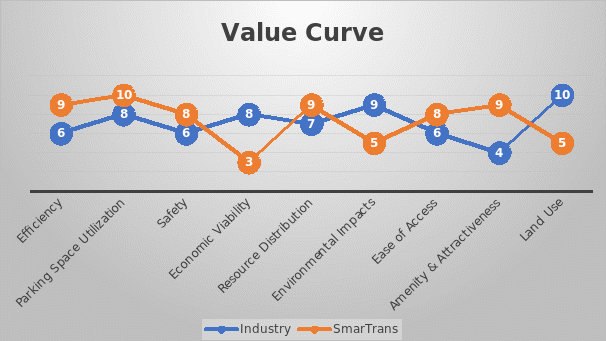Value Proposition
The primary value of SmarTrans as a company product is to create an efficient and optimized parking service within an urban environment. It addresses one of the critical issues of finding parking in a city setting which may be caused due to inefficiency, poor urban planning, or overcrowding. It is estimated that in a crowded downtown setting of a major city, 30% of vehicles on the road are attempting to find a parking space, taking an average of 7.8 minutes to do so. This leads to the waste of 47,000 gallons of gasoline that produces 730 tons of carbon dioxide per major megapolis (Geng and Cassandras 1129).
SmarTrans is a focused solution to a major relevant issue of the modern-day with the expansive usage of personal vehicles for transportation with urban environments that are unable to accommodate spaces for parking. The forced trend of increasing parking supply leads to significant land consumption and automobile usage. However, cities implementing parking management strategies saw a decrease in unnecessary parking growth, therefore reducing associated negative outcomes (McCahill and Garrick 33). As a service, it would benefit the basic consumer by creating a system that would eliminate the waste of time, fuel, and emotional stress in the attempt to find a legal parking spot at the location of one’s arrival. Furthermore, the product helps with aspects of urban planning, vehicle safety, environmental impacts, and automated technology which are essential to the development of modern “smart” cities in the UAE and internationally.

Above is a value curve that has been created comparing the assessment of industry standards and the possible value that SmarTrans would bring. These estimates were generated for the project based on the conducted research regarding the industry and the current state of parking in major cities. Furthermore, the categories which should be assessed were designed based on primary parking issues and stakeholder perspectives on the value of car parking (Beetham et al. 197). Despite being a routine aspect of automobile transportation, various stakeholders such as the city government, drivers, and business owners are involved in the decision-making process of implementing large-scale and innovative initiatives offered by SmarTrans.
KPI Measurements
It is critical to consider that SmarTrans is a technology product that will be implemented at facilities that choose to purchase and install the technology. Therefore, in determining Key Performance Indicators (KPI), the focus should remain on the product itself. However, due to the nature of this enterprise, some of the measures will be intertwined with the quality and performance measures of the parking facility itself. It was decided to divide the indicators into several distinct groups, some of which are inherently similar to related to the value proposition categories described above.
Works Cited
Beetham, F. Isobel, et al. “Stakeholder Perspectives on the Value of Car Parking.” Urban, Planning, and Transport Research, vol. 2, no. 1, 2014, pp. 195-214.
Geng, Yanfeng, and Christos G. Cassandras. “New ‘Smart Parking’ System Based on Resource Allocation and Reservations.” IEEE Transaction on Intelligent Transportation Systems, vol. 14, no. 3, 2013, pp. 1129-1139.
McCahill, Christopher, and Norman Garrick. “Chapter 3: Parking Supply and Urban Impacts.” Parking Issues and Policies, edited by Stephen Ison and Corinne Muley, Emerald Group Publishing Limited, 2014, pp. 33-55.